Industrial Roofing Contractors Hounslow
Best Industrial Roofing Contractor in Hounslow
Get 3 FREE Industrial Roofing Contractors quotes for your project today! Compare profiles, reviews, accreditations, portfolio, etc... and choose the best service.

Woolner Roofing
58 reviews10100 Old Grove Rd, Suite 100, San Diego, 92121, GBWoolner Roofing is a family-owned and operated roofing company serving the greater San Diego area. We are a fully licensed and insured roofing contractor with over 20 years of experience in the industry. We specialize in residential and commercial roofing, and we offer a wide range of services, including new roof installations, roof repairs, roof replacements, and roof maintenance. We are committed to providing our customers with the highest quality workmanship and customer service. We are also committed to using only the best materials and products. We are a GAF Master Elite Contractor, which means that we have met the highest standards of excellence in the roofing industry. We are also a member of the Better Business Bureau. Our team of experienced roofers is dedicated to providing our customers with the best possible roofing solutions. We will work with you to understand your needs and budget, and we will provide you with a free estimate. We are also available 24/7 for emergency roofing services.
- Services
- Why Us?
- Accreditations
- Our Team
- Testimonials
Get Quote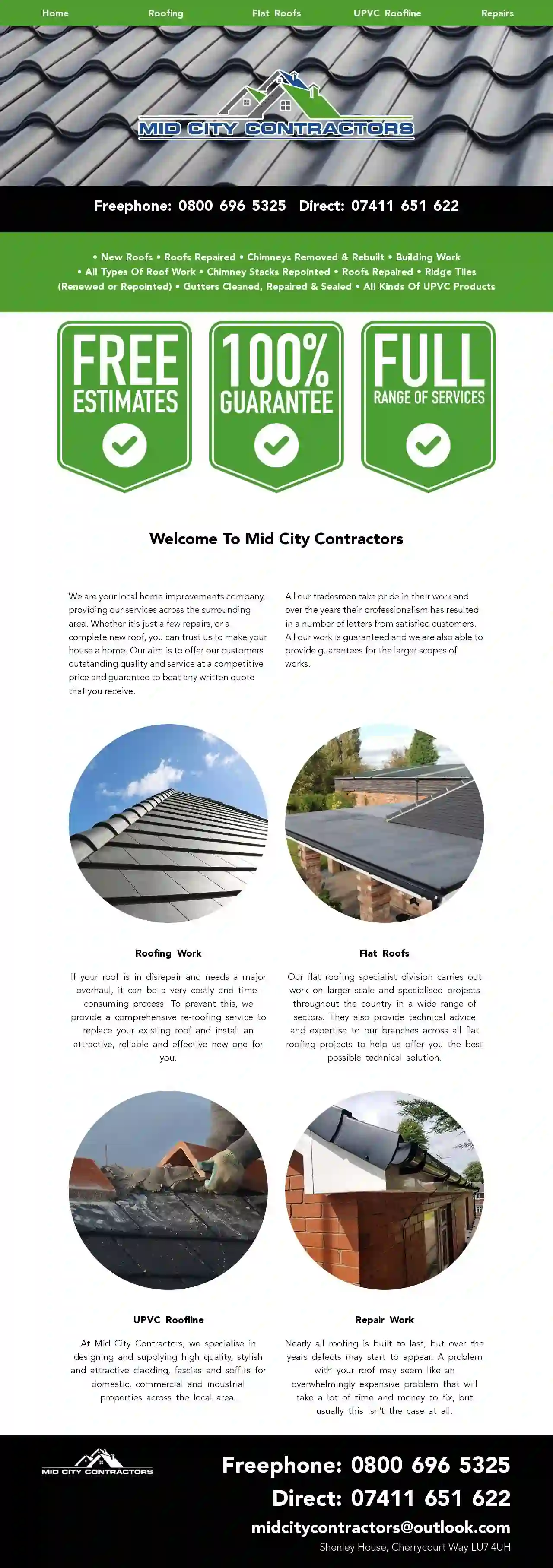
Mid city contractors
Shenley House, Cherrycourt Way, LU7 4UH, GBWe are your local home improvements company, providing our services across the surrounding area. Whether it's just a few repairs, or a complete new roof, you can trust us to make your house a home. Our aim is to offer our customers outstanding quality and service at a competitive price and guarantee to beat any written quote that you receive. All our tradesmen take pride in their work and over the years their professionalism has resulted in a number of letters from satisfied customers. All our work is guaranteed and we are also able to provide guarantees for the larger scopes of works.
- Services
- Why Us?
- Gallery
Get Quote
Aqua Roofing & Building Ltd
2.68 reviews70-72 Victoria Road., Ruislip Manor, HA4 0AH, GBAqua Roofing is a family-run roofing business with over 40 years of experience serving the local community. Based in Pinner, we provide a wide range of roofing services across London, Hertfordshire, Buckinghamshire, and Berkshire. Our team of experts specializes in all aspects of roof repairs and renewals, including flat roofing, chimney and brickwork repairs, lead work, gutter repairs and renewals, and the replacement of fascia, soffit, and barge boards in both timber and uPVC. We pride ourselves on our commitment to quality workmanship, customer satisfaction, and competitive pricing. Whether you need a small repair or a complete roof replacement, Aqua Roofing is here to help.
- Services
- Why Us?
- Testimonials
- Gallery
Get Quote
David A Siggery Ltd - Building Restoration
51 reviewsTy Gwyn, Llansteffan, Carmarthen, SA33 5AJ, GBDavid A Siggery Ltd is a well-established family run business specialising in the repair and restoration of historic buildings and structures. We offer a friendly no fuss service, providing advice and expertise to private clients and industry professionals alike. We are passionate about our work, highly experienced and honest & dependable.
- Services
- Why Us?
- Accreditations
- Gallery
Get Quote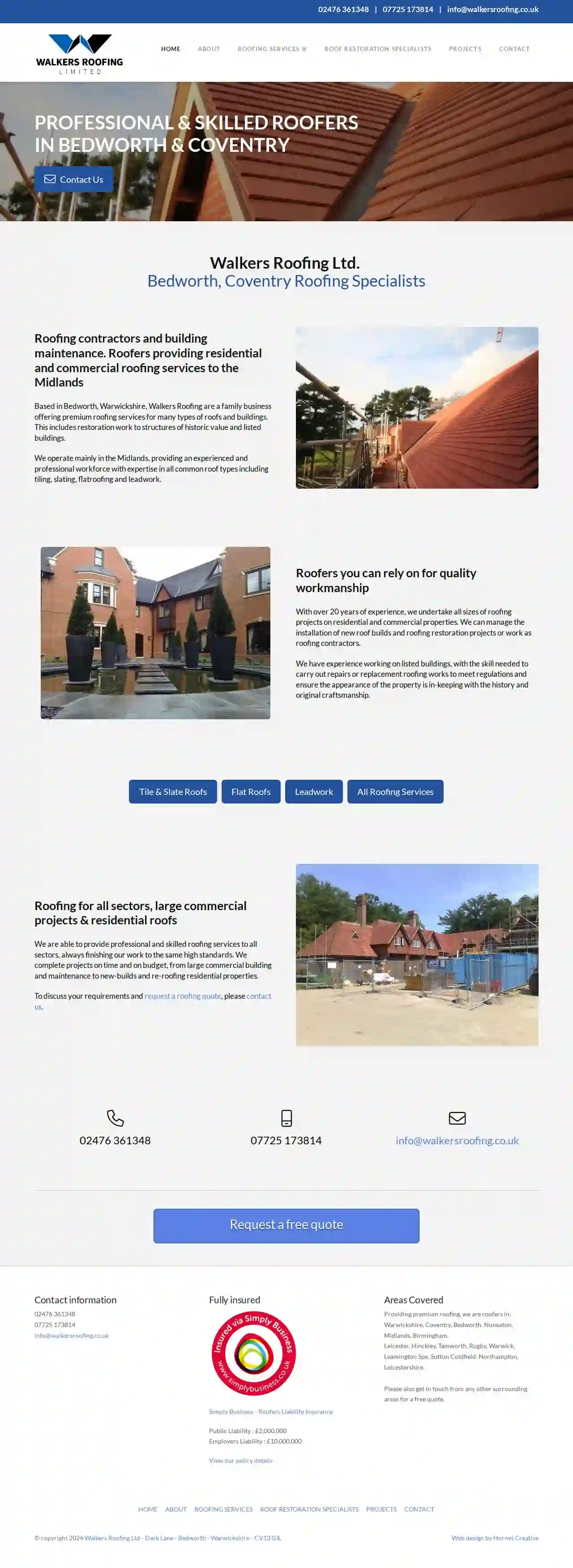
Walkers Roofing Ltd
52 reviewsDark Lane, Bedworth, CV12 0JL, GBWalkers Roofing Ltd. is a family-run business based in Bedworth, Warwickshire, with over 15 years of experience in the roofing industry. They specialize in providing professional roofing services throughout Warwickshire and the Midlands, covering both residential and commercial projects. With over 25 years of combined experience, Walkers Roofing takes pride in delivering high-quality workmanship on all projects, big or small. Whether it's a semi-detached house or a large commercial restoration, they are dedicated to meeting the highest standards.
- Services
- Why Us?
- Accreditations
- Gallery
Get Quote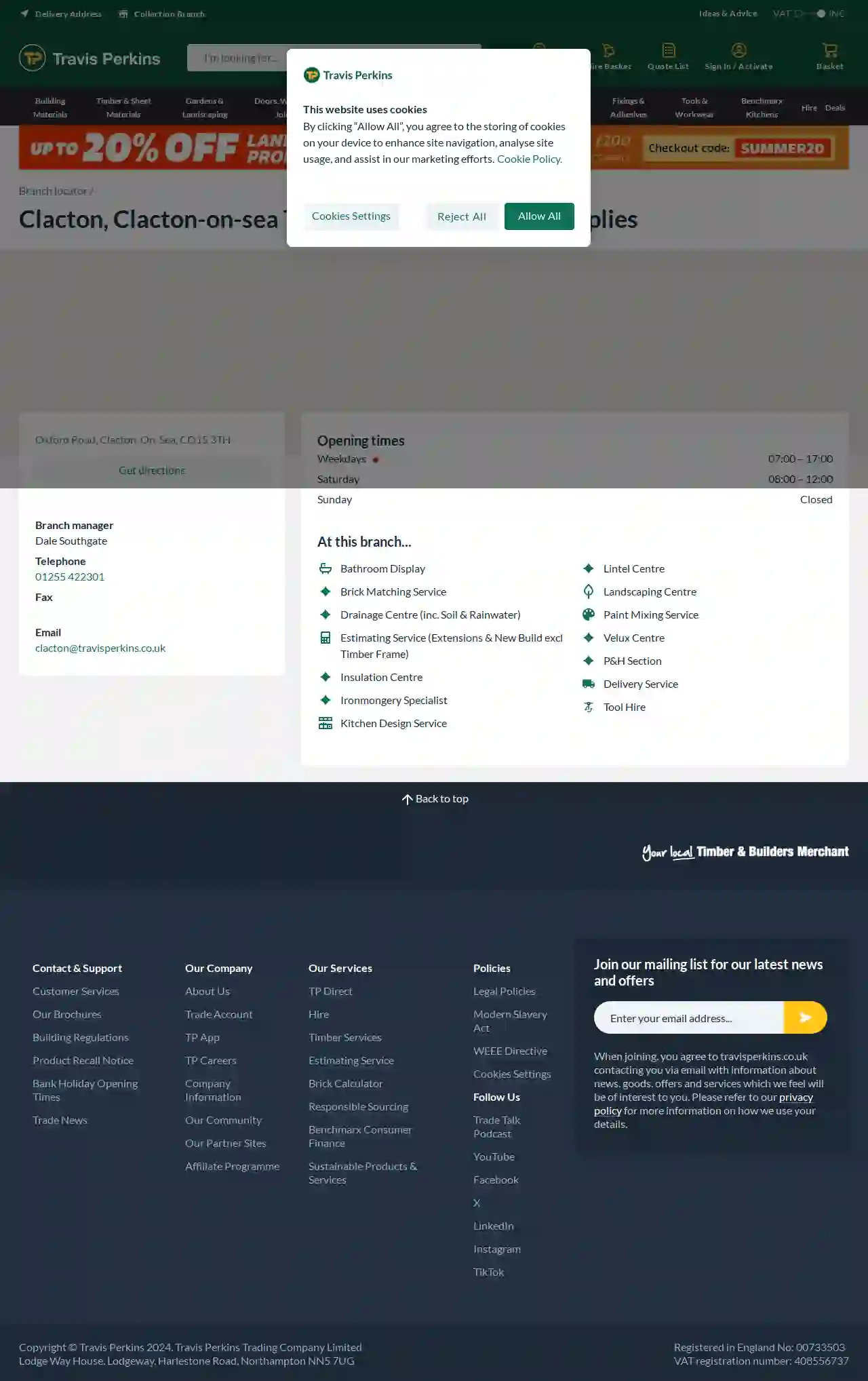
Travis Perkins
4.458 reviews100 Victoria Street, London, SW1A 2AA, GBTravis Perkins is a leading supplier of building materials and home improvement products in the UK. With over 200 branches nationwide, we offer a wide range of products to meet the needs of both trade and DIY customers. Our commitment to quality, service and value has made us the trusted partner for builders, contractors and homeowners alike.
- Services
- Why Us?
- Accreditations
Get Quote
Lewis A
GBAt South Wales Roofing Network, our members are dedicated to providing a comprehensive range of roofing services across South Wales. Whether you need roof repairs, flat roofing, pitched roofing, fascias and soffits, or any other roofing-related service, our experienced and qualified team can handle it all. We understand the importance of a well-built roof for your home or business, and we strive to deliver high-quality workmanship and exceptional customer service. From small repairs to large-scale projects, we have the expertise and resources to meet your needs. Contact us today for a free quote and let us help you protect your investment.
- Services
- Why Us?
- Gallery
Get Quote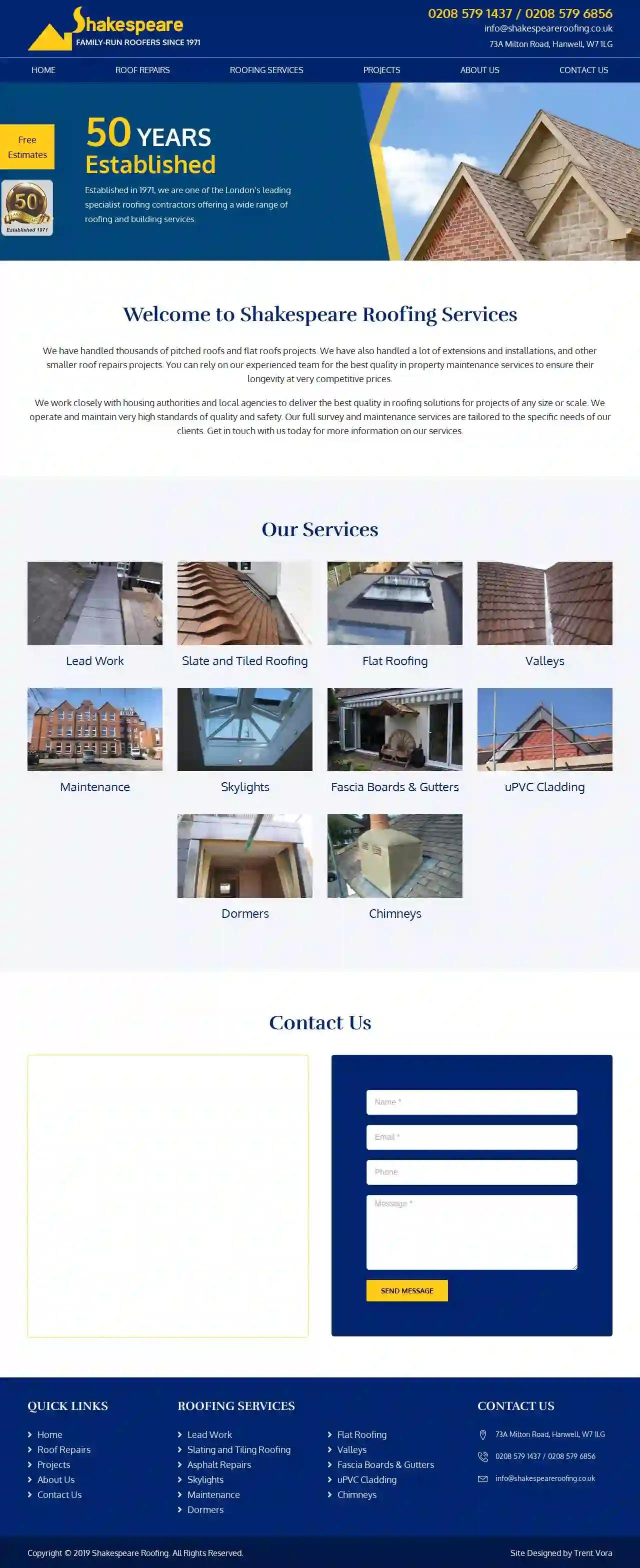
Shakespeare Roofing And Building Contractors Limited
4.820 reviews73A Milton Road, Hanwell, W7 1LG, GBEstablished in 1971, we are one of London's leading specialist roofing contractors offering a wide range of roofing and building services. We have handled thousands of pitched roofs and flat roofs projects. We have also handled a lot of extensions and installations, and other smaller roof repairs projects. You can rely on our experienced team for the best quality in property maintenance services to ensure their longevity at very competitive prices. We work closely with housing authorities and local agencies to deliver the best quality in roofing solutions for projects of any size or scale. We operate and maintain very high standards of quality and safety. Our full survey and maintenance services are tailored to the specific needs of our clients. Get in touch with us today for more information on our services.
- Services
- Why Us?
- Gallery
Get Quote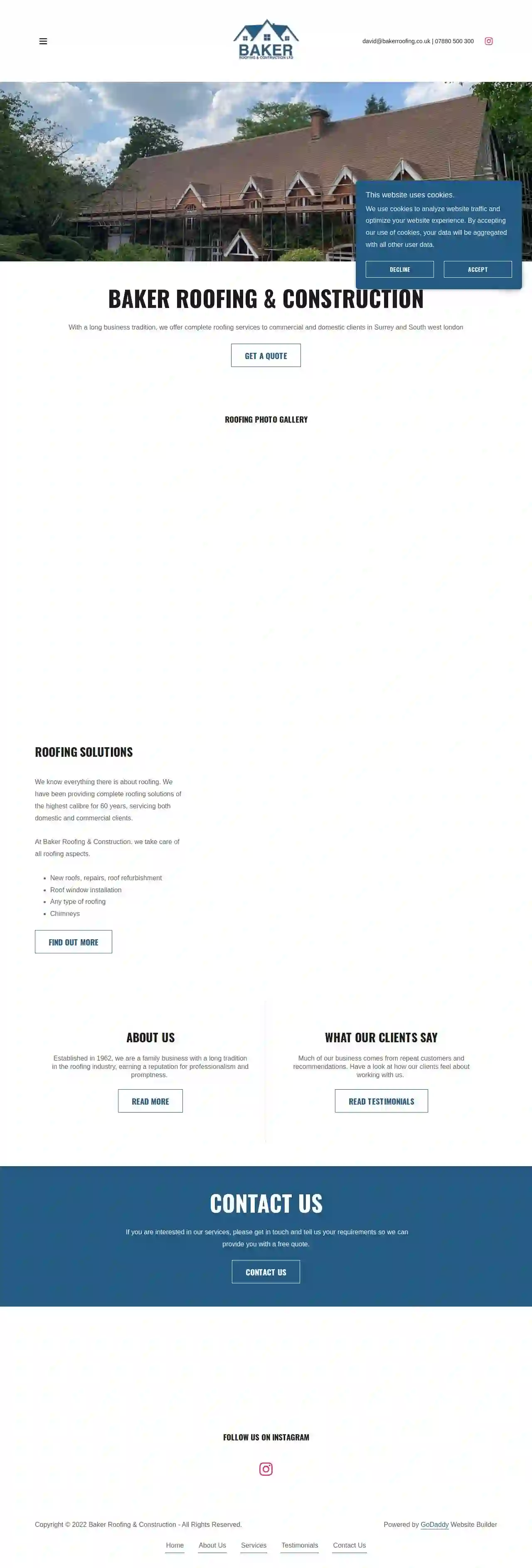
Baker Roofing & Construction Co Ltd
53 reviewsGBBaker Roofing & Construction is a family-run business with a long tradition in the roofing industry, established in 1962. Situated in Banstead, Surrey, we have been serving both domestic and commercial clients in Surrey and South London for over three generations. Our team of qualified roofers and builders is dedicated to providing excellent work on every project. We pride ourselves on our professionalism, promptness, and commitment to delivering high-quality roofing solutions. At Baker Roofing & Construction, we believe it's more than just a business; it's a tradition.
- Services
- Why Us?
- Testimonials
- Gallery
Get Quote
PMC Roofing Ltd
58 reviewsPembroke Lodge 3 Pembroke Road Ruislip, Ruislip, HA4 8NQ, GBLondon's Premier Roofing Company Quality services you can count on. 24 Hour Emergency Callouts Expert Roofing Advice Free Written Estimates Full range of roofing services Years of industry experience Get A Quote WELCOME TO PMC ROOFING LTD Roofing experts with a wealth of knowledge & skill to offer From roof repairs to new installations, we can help you. We're a team of professional roofers based in Highgate, London with over 30 years of experience in repairing and replacing a wide range of roofs, including slate, tile, metal, felt, asphalt GRP, liquid rubber EPDM, as well as lead work, chimney repointing, damp proofing, uPVC Soffits, fascia boards, guttering, and home maintenance. Free quotations & expert advice. ABOUT OUR COMPANY The performance of your roof is important to us That is why we guarantee that our workmanship is of the highest standard. We only use the best materials to deliver the best results. In addition to this, all of our work is carried out by trained roofers that have been certified to work safely and confidently on roofing projects of all sizes and complexities. PMC Roofing Ltd, London, has completed an extensive range of roofing and home maintenance projects for private and commercial customers, so it doesn’t matter how big or small or the complexity of your roofing issue, our team of trusted roofers will work hard to fix the issue. In need of roofing expertise? Contact our team today.
- Services
- Why Us?
- Accreditations
- Our Team
- Testimonials
- Gallery
Get Quote
Over 12,314+ Roofers onboarded
Our roofing contractors operate in Hounslow and surroundings!
Roofyng.co.uk has curated and vetted Top Roofers in and around Hounslow. Find a reliable contractor today.
Industrial Roofing FAQs
- Weather: Severe storms, high winds, hail, heavy rain, and snow can cause significant damage to roofing materials, flashing, and gutters.
- UV Radiation: Prolonged exposure to sunlight can degrade certain roofing materials over time.
- Foot Traffic and Equipment: Heavy foot traffic, machinery, and equipment on the roof can cause wear and tear, punctures, or damage to the roofing system.
- Ponding Water: Water pooling on the roof due to poor drainage can damage the roofing materials and underlying structure.
- Lack of Maintenance: Neglecting regular maintenance can lead to the buildup of debris, clogged gutters, and other issues that contribute to roof damage.
- Chemical Exposure: Industrial processes may release chemicals or fumes that can damage certain roofing materials.
- Manufacturer's Warranty: Provided by the manufacturer of the roofing materials, covering defects in materials. Length varies depending on the material and manufacturer.
- Contractor's Warranty: Offered by the roofing contractor, covering the quality of their workmanship. Usually covers a shorter period than the material warranty, typically 1 to 10 years.
- The existing roof deck is damaged or deteriorated.
- The existing roofing system has multiple layers.
- There are significant structural issues with the roof.
- A roof overlay (recover) is not permitted by local building codes.
What are the common causes of industrial roof damage?
What are the different types of warranties for industrial roofs?
What is industrial roofing?
What is a roof tear-off, and when is it necessary for industrial roofing?
What are the common causes of industrial roof damage?
- Weather: Severe storms, high winds, hail, heavy rain, and snow can cause significant damage to roofing materials, flashing, and gutters.
- UV Radiation: Prolonged exposure to sunlight can degrade certain roofing materials over time.
- Foot Traffic and Equipment: Heavy foot traffic, machinery, and equipment on the roof can cause wear and tear, punctures, or damage to the roofing system.
- Ponding Water: Water pooling on the roof due to poor drainage can damage the roofing materials and underlying structure.
- Lack of Maintenance: Neglecting regular maintenance can lead to the buildup of debris, clogged gutters, and other issues that contribute to roof damage.
- Chemical Exposure: Industrial processes may release chemicals or fumes that can damage certain roofing materials.
What are the different types of warranties for industrial roofs?
- Manufacturer's Warranty: Provided by the manufacturer of the roofing materials, covering defects in materials. Length varies depending on the material and manufacturer.
- Contractor's Warranty: Offered by the roofing contractor, covering the quality of their workmanship. Usually covers a shorter period than the material warranty, typically 1 to 10 years.
What is industrial roofing?
What is a roof tear-off, and when is it necessary for industrial roofing?
- The existing roof deck is damaged or deteriorated.
- The existing roofing system has multiple layers.
- There are significant structural issues with the roof.
- A roof overlay (recover) is not permitted by local building codes.